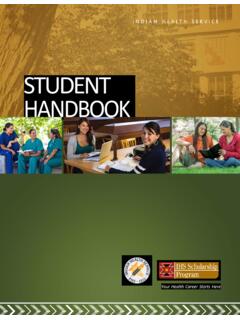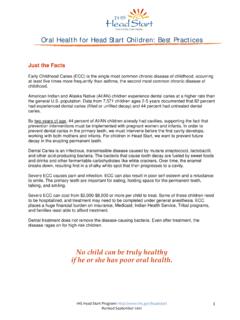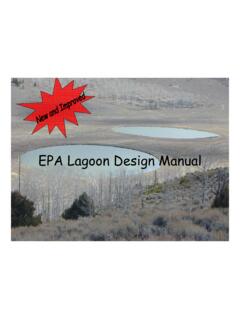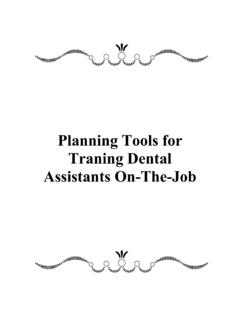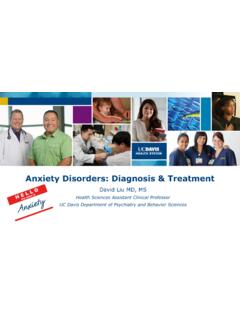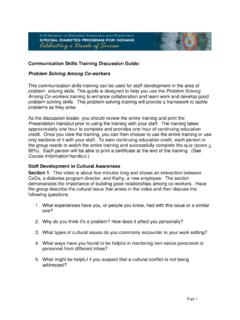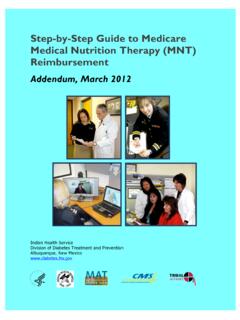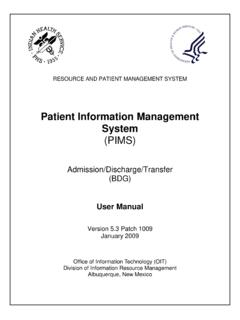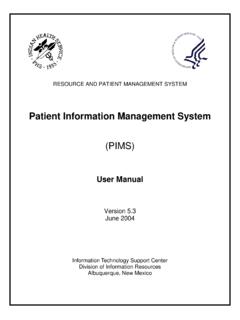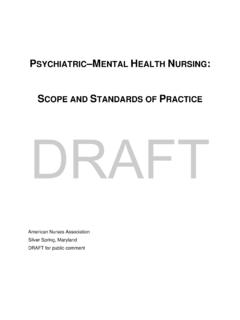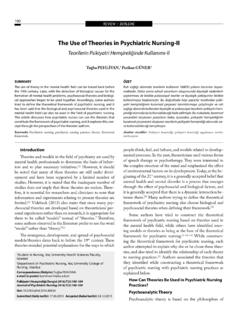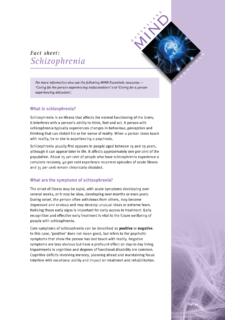Transcription of Pediatric Mental Status Exam - Indian Health Service
1 PediatricMentalStatusExamMarthaJ. Molly Faulkner,PhD,CNP,LISWU niversit y of NewMexico, Deptof Psychiatry, Division of CommunityBehavioral HealthAgendaMentalStatus Exam What Is aMental Status Exam? GeneralGuidelines WhoDoesa Mental StatusExam? ElementsofMentalStatus Exam Tools SummaryObjectives Recognizethemental statusexam(MSE) asbotha psychiatricandneurolo gic evaluation. Identifyelementsofthe pediatricMSE. Outline, as semble,refineandconduct theMSEin a systematic mannerfor Mental Status Exam? Mental statusexamination in USAormental stateexaminationin therest oftheworld,abbreviated MSE, is animportantpartoftheclinical assessmentprocessin a Mental Status Exam? (cont d) A structured way ofobserving and de scribing apatient'scurrent stateofmind, under the domains ofDomainState ofMindAppearance(dress, cleanliness,slim,obese,posture, eyecontact,quality)Thought Processes(goaldirected, circumstantial, concrete,derailed, disorganized)Attitude(demeanor,friendly, hostile,agitated, relaxed)Thought Co ntent(unremarkable,day sevents)Behavior/Motoric (wnl, hy peractive,slow, vegetative,lethargic)Perception(hallucin ations, oddpe rceptions, paranoia)MoodandAffect (happy,anxious, sad, manic, bright,congruent, expansive)Co gnition(above , average,below, delays)Speech(speed, rhythm, volume, prosody)Insight andJudgment(limited,age appropriate, good, poor, nil)WhatIsa Mental Status Exam?
2 (cont d) Onecomponentofa neurolo gicalormentalhealth/psychiatricassessmen t. Alearnedclinicalskill, not aninnateaptitude Requireseffortto develop andpracticeto maintainDefinition The MSEoriginates from anapproach topsychiatryknown as descriptive psychopathology ordescriptivephenomenologywhich developedfrom the work of the philosopherand a Germanps ychiatrist andphilosopherwhohada stronginfluenceonmodern theology, the onlyway tocomprehenda patient's experi ence isthrough hisorherown descript ion(throughanapproachofempathicandnon- theoretical enquiry), asdi stinctfromaninterpretive orpsychoanalyticapproachwhichassumes the analystmightunderstandexperi ences orprocesses ofwhich the patient is unaware, suchasdefense mechanismsor unconsciousdrives. MSE is a blendofempathicdescriptivephenomenologya ndempiricalclinical is too oftenoverlooked thesedays,andis asessentialtogood clinicalpracticeasauscultation, palpation, andpe Rapport-Welcome TheChild-Have parentin roomif soothingto child-Privacy- cl ose door-Basic Human Comforts-Calming andRespectfulDemeanor-EncourageOpen Communication-Acknowledge andVal idate Chil d s Dis tres s/ConcernsGeneralGuidelines(continued) Ask Open EndedQuestions AllowClienttoExplainThingsinHis /HerOwnWords Encourage to Elaborate,Explain Avoid Interrupting GuideInterviewas necessary Avoidasking why?
3 Insteadask, help meunderstand. Li sten andObservefor Cuesfrom ClientGenera l Guidelines(cont d) MSE is morethan simply a meansofgathering information. It is alsotherapeutic,the first contactwithpatient . MSE setsthestage foryourfuture , warm,yet neutralcanbe very soothingeven to achild who is very agitated, depressed, frightened, orangry. Youmay be rushed anddistractedbyotherthings, but yourpatient will oftenrememberyourfirstencounterevenyears later. Empathy Not synonymouswithlikingthepatient Rather, it reflects ourappreciationthatanotherpersonis suffering andexperiencing difficulty, andneeds thefull benefitofourcareandexpertise. Conducting the MSEThe routineMSEin 15 30minutes,Probes Cognition Emotions Behavior Motor ActivityExaminationtakes longerto teach and describe than it doesto perform. Thefirst MSEwitha patientservesasreferencepointagainst whichallsubsequent exams by thesameclinicianorothers will becompared, An examinerneeds to train herself/himselfsothat her/hisexaminations areconsistentovertimeandasobjectiveas possibl e.
4 Purpose- obtain acomprehensive cross -sectionaldescriptionofthe patient's mentalstate, which, whencombined with the biographicaland historical information of thepsychiatrichistory, allowsthe clinicianto makean acc uratediagnosisandformulation, which arerequired for coherent treatment formation coll ected through acombinationofdirectandindirect means: unstructuredobservation while obtaining the biographical and socialinformation, focused questions aboutcurrentsymptoms MentalStatus Exam?Trained Nurses Counselors Therapists Physicians Psychiatrists NursePractitionersElementsofMSEI. Appearance, Attitude,Behavior, s ofMSE(cont d) FunctioningXI. Judgment andInsightI. Appearance, Attitude,Behavior,and SocialIn teractions Dress(ageap propr iate?) Easein Separationfrom Parent MannerIn Relating (regressed?) Attention Span Speech andLanguageAppearance Doesthe childappearto be well-nourishedandwell-developed; is heoverweight ortoothin?
5 Is the child well-groomed,well-dressedand attentiveto personal hygiene? Who accompanies the child? Are they sitting,standing, lyingdown? Eyecontact andrelatedness?II. MotoricActivity Hyperactive Still Fidgets Into EVERYtoy Gross(la rgemusclegroups) or Fine(small musclegroups) Motor CoordinationIIIMood Howdoyoufeel; thisis patient ssubjectiveself-report andis bestpresentedasdirect quotesin thepatient sownwords(eg, Ifeelangry. ). Fantasies, Feelings,andInferredConflicts Nonverbal Cluesto Feelings Clues to Depression AnxietyIVAffect Does thepatientdisplaythenormally expectedrangeoffacial expressiveness -a narrowingorconstrictionofaffect -a flattening ofaffect?IVAffect(cont d)Does thefacialexpressivi ty showlability(rapidlychangingmood,tearful , difficult to control); is thelabilitymarked?Is facialexpressivity andaf fectualdisplaysappropriatewithrespectto: prevailingmood, ideationalcontent?
6 V Speech Think aboutmusicanddescribethemusicalqualities of speech ~ rat e, rhythm,loudness andtonality.~note unusual pausesor latencies, articulationproblems, andstutterin g andstammering~ Processes Listen! Flowandproduction Paucity Overproductive Rapid Coherent/Incoherent Understandable?Thought Processes(continued) Dothey: ~respondto questions in a logical,relevant coherent andgoal-directedmanner? ~givetoo much, unimportantdetail(ie, circumstantial)? ~skipfromtopicto topicnot elaborating fullyonanyoneofthem(ie, tangential)?ThoughtProcess es(cont d) repeat words, phrases and thoughts and have difficulty switching topics (ie perseverative)? Use words idiosyncratically? Use words in a way that doesn't adequately serve the purpose of social communication? Do they have receptive/expressive issues?VIIT houghtContent Dothey:~have over valuedideas?~express firmly held,fixedfalse beliefsthat cannotbe explainedbythe patient scultureor religion?
7 ~have any unusual sensoryexperiencesor perceptions; if so,in which sensorymodality? hallucinations?~ haveactivesuicidal orhomicidalideation, intent and plan;e lattermust be thorough and (cont d) Hallucinations AuditoryHallucinations Visual hallucinations Obsessionsand Compulsions ImaginaryCompanionsVIIII ntellectualFunctioning Orientation to Time,Place,PersonandSituationalContextCo gnition: Assessdomains ofcognition. Attentionandworkingmemory-~have childspellshortwords forwards andbackwards~days ofweek andthen backward~monthsofyearandthen backwardVIIII ntellectualFunctioning(cont d) Registration andshort-termmemoryask childto repeata listofthree items presented earlierin the interview-alwayskeep same3 long-termmemoryask wherethey went to school previously andcurrently, calculations(serial subtractionof 3 s or7 s), andvisuospatialability(askthe pa tient to drawa geometricfigurefrom a sampleandlaterfrom memory).
8 VIIII ntellectualFunctioning(cont d)AbstractionEvaluatewithsimilarities/di fferencesofap ple andorangeandproverbs whatdoes youcanleada horsetowaterbutyoucan tmakehimdrink or even monkeysfalloutoftrees mean? EstimatedIntelligence average , above , below , unabletodetermine andInsight Judgment regardingday to day behaviors Insight intowhy theyarehere, havingbe haviorproblems,anxiety,depression,anger Rat e or Specify:Excellent, good,impaired, poor, nilMulticultural andSpecialPopulationsin Brief Developmental Disabilities Cultural Diversity Pre school ChildrenDevelopmental Disabilities Interventions should be tailored to eachchild, Mustlo okforsensoryissues Somechildren ha ve a hyper arousal andothers hypo arousal MustadjustyourMSE tothechild sneeds ,activities andexpectationsCulturalDi versity Aswith anypeople be carefulof your ownassumptions Selfassessment ofownbias andprejudice Be willing to examinewhatyou thinktobetrue MSEmakes assumptions socallednormalbehaviorsandprocesses des pite cultural considerations NOTSO!
9 Canleadto misdiagnosis Af fect,eye contact, thought processes Fa mily involvement maybe preferred, assess,ask, seek Cultural Dive rs ity(con td) Acculturation and itsvariability within the same family or different contexts Impt to learn about cultures but realize the broad diversity within each culture, tribe, country, in NM Problemswith assessmentoccurs whencli nicians ignore ethnic variablesbe cause ofnarrow de finitions, political and economic factors that helpdistinguish cultureCulturalDiversity(con td) Limited eyecontactmay be sign ofrespect and notnecessarilypathological Familyinvolvement essential Cultural norms for childandfamily im portanttoidentify Longertermtherapiesmay be important Therapists investmentin thefamily andchildcritical If tx livesona reservation observedfor behaviorthat is congruentto tribal valuesPr esc hoolChildren Be spontaneous, willing to be sill y- helpsdeterminechild sabilitytoconnectandbe in relationship Regulationof emotions/activity Sel f soothing capacity Sensory Integratio n-Alert Program TransitionsPreschoolChildren(cont d) Speech Play/Fantasy UnusualBehaviors Sleep Patterns Interpe rsonal Behaviors- withcaregiver,withclinicianSummary MSE is animportantaspect ofpsychiatricandneurologicas sessmentofchildren.
10 Clinicalskill thatmust be learnedandindividuallyrefinedby theclinician Importanceofassessing childrenandadolescentsin a systematicwayTools Sent FolderofAssessment Tools Willsendthese to conferenceplannersReferences Interview with Stephen Deutsch, MD, April 2, 2007,TheElements and ImportoftheMental Status Examin ationAssociateChief ofStaff , Mental Health ServiceLine, Department ofVeteran Aff airsMedicalCenter; ProfessorofPsychiatry,GeorgetownUniversi tySchool ofMedicine Dennis,JerryL Medical Director, ADHS/DBHS, PsychiatricMental Status Exam. Centers fo r AmericanIndian and Alaska Native HealthColorado School Diagnosisin a MulticulturalContext: A Casebook fo r Mental Health ProfessionalsBy FreddyA. Paniagua Culture andTherapeutic Process:A Guidefo r Mental Health Professionalseditedby.
